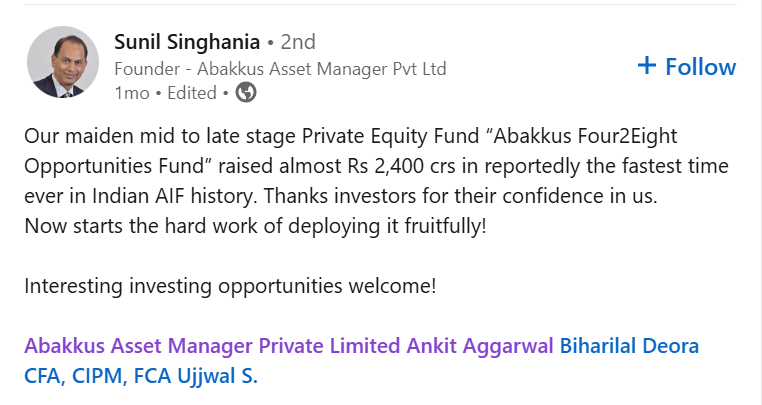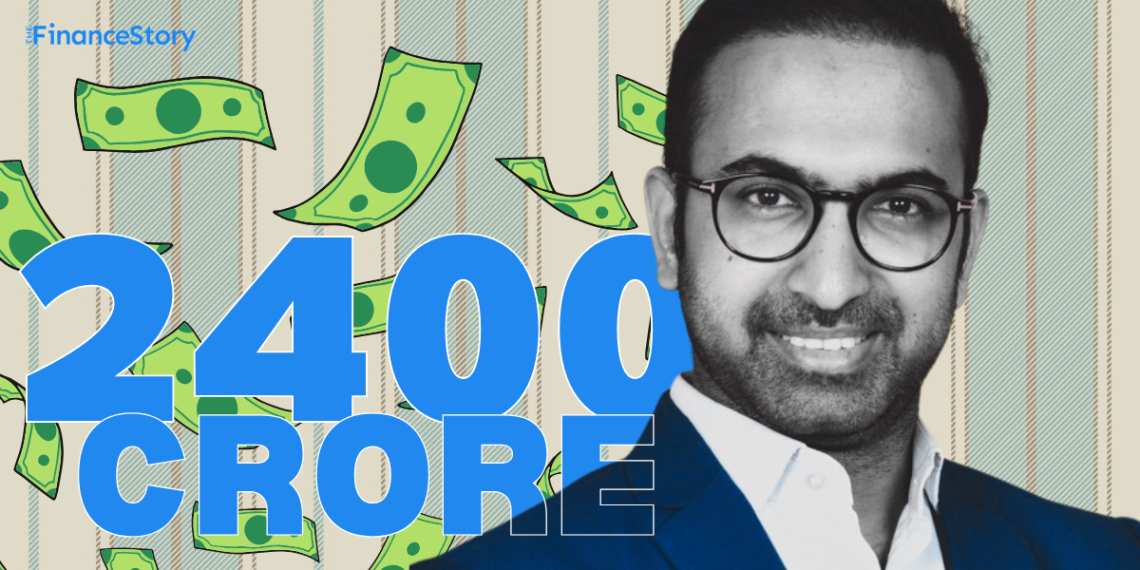- In 2018 Sunil Singhania, ex-CIO of Reliance Mutual Fund, founded Abakkus Asset Manager, now managing ₹36,700 Crores in Indian listed Equities.
- In Nov 2024, it raised ₹2,400 crores for its first private equity (PE) fund AbakkusFour2Eight in record time!
- We spoke with Ankit Aggarwal, Fund Manager at Abakkus to explore India’s top opportunities and investor sentiment.
What inspired you to dive into the exciting world of private equity?
I am a Computer Science Engineer who quickly realized that investing was where I wanted to build my career! (Yes, a typical engineer making the leap into finance!)
And the idea of investing in companies not listed on the stock exchange really intrigued me – so I decided to dive into private equity!
2006. Fresh out of college, I kicked off my career as an Analyst at a hedge fund in Mumbai, India.
2007. Things took off when I joined Lighthouse Funds, an India-focused growth-stage PE firm, now managing over $1.4 billion!
Back then, the team was just starting to raise funds in India, giving me a front-row seat to build a PE firm from the ground up.
I spent six years at Lighthouse.
2012. I went to Wharton for my MBA. I was strategic about it – seeking a global education to build a broader network, gain a fresh perspective, and elevate my profile.
After Wharton, I spent a few years in the U.S. working with Argonaut Private Equity, now managing $2.9 billion in assets. I focused on investments in Israeli and U.S.-based startups. Another terrific experience!
2016. I returned to India and joined Fosun, a Shanghai-based PE fund focused on India, followed by a stint at Kotak Alternate Asset Managers.
Then came the exciting opportunity to join Abakkus Asset Manager founded by successful Sunil Singhania who had managed billions and billions of dollars as a CIO for Reliance Mutual Fund!
In November 2024, we raised ₹2,400 crores for our maiden PE fund, Abakkus Four2Eight, to capitalize on India’s booming economy!
Abakkus raised its maiden ₹2,400 crore fund. What opportunity drove this move?
In 2018, Sunil founded Abakkus Asset Manager, which now manages over INR 35,000 crores in public market assets.
The Public markets have rallied significantly making it challenging to replicate the returns seen over the past 4–5 years.
Sunil identified a unique opportunity in the private equity space, where high-quality businesses are available at attractive valuations 6 months to 2.5 years before their IPOs.
We saw the potential to step in and generate alpha for our investors & entrepreneurs, which led to the launch of our private equity fund, Abakkus Four2Eight.
Also, there’s plenty of capital for new-age companies, but many solid, profitable businesses lack the funding they need.
In August 2024, after months of preparation, we raised the fund in record time – setting a new benchmark in AIF India’s history!
Our fund is rooted in India’s incredible growth story: it took 75 years to reach a $4 trillion economy, but the next $4 trillion is expected in just 7–8 years. That’s the inspiration behind the name Abakkus Four2Eight!

Who are the key investors backing your PE fund?
Our fundraising primarily came from the domestic market, including a mix of HNIs and family offices, with some foreign capital.
What’s the investor sentiment around the Indian market?
According to S&P Global, 298 companies went public in 2024, raising ₹1.4 trillion ($16.6 billion) — a 140% increase from 2023. Investors have seen their wealth grow by $1.5 trillion since last Diwali!
The investor sentiments are optimistic.
While the U.S. and Europe face challenges, India stands out as a dynamic, high-growth market with a young, ambitious population and a rapidly evolving digital and manufacturing ecosystem.
10 – 15 years ago, when Foreign Institutional Investors sold, markets would crash as India heavily relied on foreign flows. Today, Indian public markets are much more driven by domestic flows and they are stepping up in a big way.
For instance, Zepto recently raised $350 million – with 100% contributions from domestic investors.
The Indian government has done a fantastic job in terms of “Make in India” and “China Plus One”, which is also driving optimism.
How do you identify companies to invest in? What are the metrics?
We are fundamental investors, so it’s important that we invest in high-quality businesses that are:
- Profitable
- Strong Return on Equity and Return on Capital Employed
We typically target companies with EBITDA of about ₹100 crores. Even if they haven’t reached that yet, we look for businesses that will achieve it in the next 1-2 years.
We’re also open to investing in companies with higher EBITDA, where we may come in as a smaller investor.
Our focus is on companies 2 to 3 years before an IPO, a stage where “price discovery” is still in progress. This is where we step in, guiding companies and adding significant value as we approach the market.
We’ve identified several subsectors that we believe will do well as India grows from a $4 trillion to an $8 trillion economy.
For example, we focused on the mining and services sector and identified good-quality companies, one of which we’ve already invested in.
We’re very bullish on the following:
- Healthcare
- Infrastructure. India can’t achieve its $8 trillion economy without significant infrastructure spending
- Consumer sector (Rising consumer demand)
- Financial services
We have access to various software tools that help us identify potential investments.
Our core thesis is to invest in high-quality, profitable businesses across sectors, as minority investors, and be strong partners throughout their journey.
What’s your day-to-day role like? What skills help you excel?
A significant part of my day involves identifying and evaluating potential investment opportunities.
Unlike public markets, if the companies you invest in don’t perform well, you can’t just sell the shares and exit.
Thorough diligence is critical – you need to meticulously evaluate the business. Once you’re confident, the process moves into documentation, including drafting shareholder agreements and finalizing terms.
Post-investment, we actively engage with these businesses – either by sitting on their boards or working alongside the management teams to help them scale.
The work is demanding, with long hours and small teams, but it’s incredibly rewarding because, you constantly learning, and analyzing various sectors!
Advice for CAs looking to join private equity?
We value CAs immensely at Abakkus. Our team has quite a few CAs!
Why? The CA program’s rigour and discipline translate into excellent analytical and problem-solving skills, which are invaluable in private equity.
For aspiring CAs, private equity can be a natural progression after gaining experience in:
- Investment Banking
- Consulting (e.g., McKinsey & Company, Boston Consulting Group, and Bain & Company),
- Big 4 firms specializing in commercial or financial due diligence
These roles provide a solid foundation and relevant skills, making the transition to PE smoother.
What’s next for private equity in India?
India has already reached a $4 trillion economy. With a 6-8% real GDP growth plus 4-5% inflation, we’re on track for a 12% CAGR and are poised to reach an $8 trillion economy in the next 7-8 years. While the timeline may shift slightly, India is well-positioned with a stable government and cutting-edge technology like UPI.
While we may still be smaller than the U.S. market, the pace at which India is growing suggests we could surpass expectations in the next 5–10 years.
India has a knack for exceeding forecasts, proving skeptics wrong, and delivering outsized returns.
As entrepreneurs continue to emerge the demand for growth capital will only increase. Private equity will play a significant role in this journey!
The future of private equity in India is bright.







